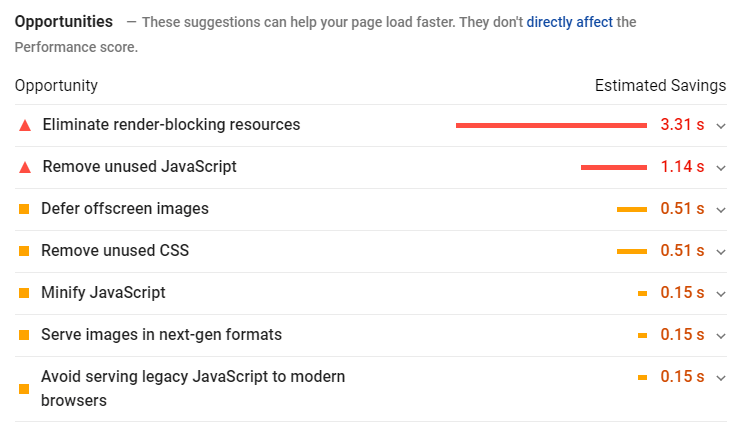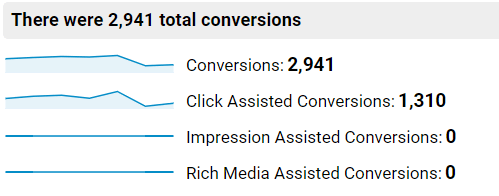7 Key Website Metrics to Watch in 2021[+How to Improve Them]
If you’re launching a search engine optimization (SEO) campaign, you need to track performance metrics to ensure your site drives the results you desire. If you don’t track key metrics, you may find yourself pumping money into a strategy that isn’t providing a return.
So, what metrics do you need to track for success?
Here are seven key website metrics to watch in 2021:
- Organic traffic
- Page load time
- Bounce rate
- Organic clickthrough rate (CTR)
- Pageviews per session
- Average session duration
- Conversion rate
Keep reading to learn more about these metrics!
P.S. Want to get the latest marketing tips to help you market your business better online? Subscribe to our email newsletter!
Are you interested in custom reporting that is specific to your unique business needs? Powered by MarketingCloudFX, WebFX create custom reports based on what you care about most.Measuring what matters most
Key website metric #1: Organic traffic
First on our list of the most important Google Analytics metrics is organic traffic.
Organic traffic is a great metric to track because it tells you how many people visit your website when they conduct an organic search. Your organic search traffic is important because it’s a direct reflection of the success of your search engine optimization (SEO) campaign.
How to boost this Google Analytics metric
If you track this metric and find it’s not up to par, there are a few things you can do to help you boost organic traffic on your site:
- Verify you’re targeting the right keywords: If your organic traffic is low, you may not be targeting the right keywords for your business. Check your Google Analytics to see what keywords drive traffic to your site and determine if you need to reevaluate your choices.
- Create content: Creating content will help you boost organic traffic on your site. Focus on creating industry-related content that targets relevant keywords in your industry. It will help you attract more people who actively seek information on industry-related topics.
- Ensure that your SEO campaign is in good shape: Your SEO is a critical component to driving high organic traffic to your site. You’ll want to use an SEO checker to see where your SEO currently stands and how you can improve it to drive more qualified traffic.
Key website metric #2: Page load time
When you’re looking at Google Analytics key metrics, you’ll notice that page load time is often mentioned.
Page load time is fundamental to helping you rank in search and drive qualified traffic to your site.
Users hate to wait for slow-loading pages — 83% of users expect your website to load in three seconds or less.
So, if you’re looking at your Google Analytics metrics and seeing that your page load time is much longer than three seconds, it’s time to optimize your site to load faster.
How to boost this Google Analytics metric
You can obtain tips for boosting your page speed by inputting your website into Google PageSpeed Insights. PageSpeed Insights will show you different metrics of your site’s load time, but it will also provide you with opportunities for improving site load time.

Some common ways to decrease page load time include:
- Optimizing your image file sizes to be smaller
- Minimizing HTTP requests
- Enabling browser caching
- Reducing redirects
- Hosting videos on an external platform like YouTube
- Minifying and combining HTML, CSS, and JavaScript files
Key website metric #3: Bounce rate
You can’t add page load time to your list of key website metrics to watch in 2021 without adding bounce rate to the list, too.
Bounce rate measures the percentage of sessions where someone leaves your site without interacting on your page or visiting other pages.

So, if someone clicks on your listing in search, loads your page, and immediately goes back to the search results, they’ve bounced.
It’s one of the most important Google Analytics metrics to monitor because it helps you determine if your page provides the information your audience needs.
So, what’s a reasonable bounce rate for your business?
Well, it depends upon your business and your industry. For ecommerce businesses, a reasonable bounce rate is somewhere between 40% and 60%. For other companies, it may be higher or lower. You’ll need to research your industry’s benchmarks to see what an acceptable bounce rate is for your business.
How to reduce this Google Analytics metric
If you find your bounce rate is too high, you can take a few actions to help prevent people from bouncing off your page:
- Verify you’re matching user search intent: User search intent is your audience’s motivation behind searching. If you’re not meeting their search intent, they’re likely to bounce from your page. Ensure you’re providing relevant information to the search so people stay and engage with your content.
- Check site load time: Slow-loading pages can cause people to bounce from your site because they don’t want to wait for your pages to load. Follow the best practices we listed above to help improve your site’s load time.
- Analyze the page set-up: If you experience an exceptionally high bounce rate, it may be due to your page’s structure. Do you have broken links, abnormally large images, or long paragraphs of text? These elements may frustrate users and send them back to search results, so fixing these issues can help improve bounce rate.
Key website metric #4: Organic CTR
One of the most important web metrics is organic clickthrough rate or CTR.
CTR measures how many people saw your listing in the search results versus how many people clicked on that same listing. This metric is one of the most important Google Analytics metrics because it tells you if people find your listing relevant to their query.
You want to have a high CTR because it indicates that more people find your listing relevant to their search query.
How to boost this Google Analytics metric
One of the best ways to improve this metric is to optimize your title tag and meta description.
Title tag
Your title tag is what people see first in your listing. It tells them if your site is relevant to their query and entices them to click. Search engines also use your title tag to determine your relevancy in search results.

To have a title tag that drives more clicks, you must ensure your target keyword appears towards the beginning of your title tag, so people know your listing is relevant immediately. You’ll also want to stick to the 60-character limit to avoid a truncated title — these title tags look unpolished, which can prevent clicks.

Additionally, make sure your title tag is eye-catching and enticing, so users will want to click on it to learn more. Try using power words like “ultimate,” “limited,” and “massive” to spice up your title tags.
Meta description
Your meta description is the small blurb that appears below your title tag. This tag provides your audience with a quick summary of what to expect on your page. While it doesn’t directly impact your site’s ranking, it does influence users to click on your listing.

To get the most from your meta description, provide a summary of what to expect on your page. Stick to the 155-character limit, so your meta description doesn’t get cut off and look unpolished. You’ll also want to ensure that you use your core keyword somewhere within your summary.
Key website metric #5: Pageviews per session
Pageviews per session is another one of the key website metrics to watch in 2021.
This metric, as the name implies, analyzes how many pages people visit in an individual session.
Pageviews per session is one of the most important web metrics because it tells you if people visit your page and leave, or if they stay on your page and poke around your site for some time.
Not only that, but it provides you with insight on whether your site’s flow encourages people to take the next step and remain on your site.
How to boost this Google Analytics metric
There are a few things you can do to help keep people on your website longer:
- Create a simple and easy-to-use navigation: It’s hard for people to visit other pages on your site if they can’t find them. Creating a simple and organized navigation makes it easy for people to find relevant pages on your site. It can help encourage people to checkout core pages like your product, service, or contact pages.
- Implement call to action (CTA) buttons: People may like what they see on your page, but if you don’t tell them how to proceed next, they won’t know how. Using enticing and descriptive CTA buttons, though, helps guide them to the next step and gets them to visit more pages on your site.
- Use internal linking: Internal linking, which involves linking to other pages on your site within your text, is a great way to keep people on your site longer. If they’re unfamiliar with something you said or want to know more, they can click on these links to learn more and remain on your page longer.
Key website metric #6: Average session duration
When you’re compiling a list of Google Analytics key metrics, don’t forget to add average session duration to your list.
Average session duration measures how long people spend on your site in one session.
You should aim for a long average session duration since it’ll mean people are engaging with your site and finding products or information they like. If people look at your business more in-depth, they’re most likely a qualified lead for your business.
How to boost this Google Analytics metric
If you want to boost this Google Analytics key metric, try adding interactive content to your website. Interactive content encourages your audience to spend more time on your site by getting involved with your pages.
One of the most compelling interactive elements is video. Videos are great for enticing your audience to engage and getting them to stay on your page — people spend 88% more time on pages with videos. So, you can increase your average session duration by merely adding a relevant video to the page.
Additionally, you can use other visuals, like motion graphics, interactive graphics, and animated infographics, to catch your audience’s attention and get them to engage on the page.

When you make your pages more interactive and engaging for your audience, they’re more likely to remain on your site longer.
Key website metric #7: Conversion rate
Last on our list of key website metrics to watch in 2021 is conversion rate.
Conversion rate is something most businesses track, as it tells them how often someone who visits their site ends up purchasing. It’s a valuable metric to follow to ensure you’re on-par with your business’s goals.

Conversions can come in numerous forms. You may aim to get people to buy your products or register for an event. Your form of conversion depends upon your business and goals.
Regardless, tracking your conversions is critical to see if your SEO efforts effectively help your business grow.
How to boost this Google Analytics metric
Conversion rate is one of the most important web metrics, as it impacts your business’s revenue. To help you improve your conversion rate, follow these best practices:
- Use only one CTA button to keep your audience focused
- Include images and videos in your product listings so people can get a good look at what you offer
- Implement whitespace in your website design to make your site easy to view
- Make your checkout process simple
Want to improve your conversion rate for your business? Use our free conversion rate calculator to help you get started!
Let WebFX help you boost your Google Analytics metrics
You know the key website metrics to watch in 2021 but trying to optimize your site to improve these metrics can be an overwhelming task. If you don’t have experience or time to optimize and improve your site to boost these metrics, WebFX can help.
With a team of over 250 marketing experts, you can feel confident that we know how to craft SEO campaigns that drive results. In the past five years, we’ve driven over $2.4 billion in sales and over 6.3 million leads for our clients.
From implementing strategic changes to tracking your most important web metrics, we do it all.
Want to learn more? Contact us online or call us today at 888-601-5359 to speak with a strategist about our SEO services!